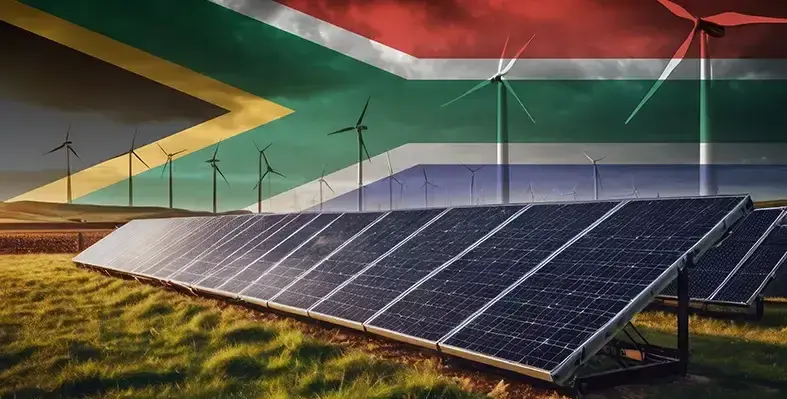Power shift: Reimagining South Africa’s energy sector through inclusive leadership, by Kirsten Francis, coach at the Hasso Plattner d-school Afrika at UCT and co-founder of Jade-Sky Holdings
South Africa is transitioning from fossil fuels toward renewable energy, as the government aims to add at least 19 GW of renewable capacity by 2030 and as much as 190 GW by 2050. These targets are critical for climate resilience and energy security. Yet, the social design of this transition is dangerously overlooked.
More than 40% of South Africans still live in energy poverty, and women make up just 14% of the renewable energy workforce, with ownership and procurement remaining concentrated and locked in by structural inequality. To meet South Africa’s energy future with resilience and innovation, this transition must actively include diverse voices — especially women — if we want to design and drive solutions that serve all communities.
From wild idea to 1,414 MW portfolio
My sister and I entered this sector with no background in engineering or finance. We had no roadmap, only a wild idea: to own a wind turbine. That idea was so wild, I only shared it with her. But we believed it was easier to ground a wild idea in reality than turn a boring one into something exciting.
This belief stems from the Design Thinking mindset I teach: “Yes, and?” Instead of overanalysing or discounting bold ideas, we kept saying yes and looking for opportunities that would get us closer to that one turbine. Using our roles managing Windaba, Africa's largest wind conference, we incrementally built networks and sector knowledge. We researched, learned and positioned ourselves strategically. When policy shifted in 2020 to require women-led business participation in procurement, we were ready — not by accident, but because we had been designing our way into the industry for years.
Our journey from that single wild idea now encompasses equity in 1,414 MW of solar PV and onshore wind projects. This scale demonstrates that non-traditional pathways can achieve transformational impact when strategic positioning meets opportunity for policy shifts.
The strategic value of inclusion
As a women-led family business, we understand that energy sits at the nexus of everything. Access to energy drives economic growth, which is why our 20-year operational view focuses on early childhood development, healthcare, and sport in host communities. This isn't corporate social responsibility, it's an investment in the ecosystems where our projects operate.
The necessity for women to participate actively in the sector allows us to be strategic about investments and partnerships, always revisiting our core values. Inclusion isn't just ethical; it's a business imperative creating competitive advantages through diverse perspectives and community-rooted approaches.
Breaking down the barriers
The sector's greatest barriers aren't technical — they're cultural and institutional. We've been consistently underestimated with our communication science, political science, gender advocacy, and project management qualifications often dismissed in favour of traditional hard skills.
The industry uses jargon as gatekeeping, creating artificial barriers that shut out capable contributors. We've had to overcome imposter syndrome by embracing authenticity. It's okay to admit you don't know something — people want to help if you ask genuinely. This authenticity has opened doors that credentials alone might not have.
For women and entrepreneurs from non-traditional backgrounds, success requires surrounding yourself with willing mentors, building values-aligned networks, and committing doggedly to learning. The sector offers multiple entry points but requires confidence in understanding all the moving parts.
Design Thinking as a navigation tool
Design Thinking is more than a methodology for us — it's how we navigate uncertainty in a world demanding certainty. While traditional business operates with rigid mindsets, Design Thinking provides frameworks for embracing ambiguity and turning it into a competitive advantage.
This approach allowed us to identify real needs in the energy sector and remain agile through the complex Broad-Based Black Economic Empowerment investment landscape. We constantly iterate on who we are as a business, diversifying our role from project managers to equity holders while maintaining our values-based foundation.
Change requires new mindsets to support new policies
South Africa’s energy future will not be shaped by individual success stories alone. It depends on how we rethink the systems that determine access, ownership, and participation. While steps like the 2021 procurement requirements for women-led businesses have opened doors, broader transformation is still needed.
Progress comes from equipping more people across sectors and backgrounds with the mindsets to challenge the status quo, design inclusive solutions, and build systems that reflect the needs of all South Africans.
Lighting the way forward
Entrepreneurship is often a lonely, long road. But understanding your responsibility to craft pathways for others helps you push through challenges. Leadership requires constant revisiting of first principles; interrogating your why, iterating through complexity, and designing solutions that work for everyone.
As the country accelerates its energy transition, we must move beyond asking how much power we can generate to asking who we generate it for, and with. The success of our transition depends not just on technical capacity, but on whether we design it to serve all South Africans.
It takes audacity to dream big, but tenacity to remain at the table. The future of South Africa's energy sector — and the communities it serves — depends on both.
Read more:
JA Solar, Juwi sign SA solar modules deal












